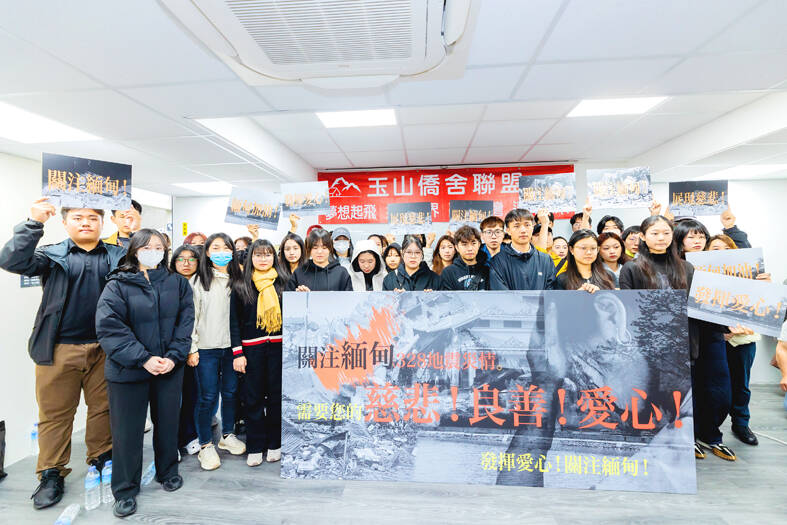As images of destroyed buildings in earthquake-hit Myanmar flashed across her television screen in Taiwan, Yang Bi-ying could only weep for her family there.
Yang, 76, has lived in Taiwan for more than half her life and has a daughter-in-law in the central Myanmar city of Mandalay, which was devastated by Friday’s massive earthquake.
At least 1,700 people have been killed in Myanmar and neighboring Thailand, and hopes of finding more survivors are fading fast.

Photo courtesy of the Burmese student group in Taiwan
Yang said her daughter-in-law was safe and other relatives in Yangon were unaffected by the magnitude 7.7 earthquake and its aftershocks.
“I could only cry. There was nothing else, just tears,” said the grandmother at an eatery in a Sino-Burmese neighbourhood near Taipei.
“Every family has been worried, especially for those buried under the rubble. What could be done? Nothing. It’s all in the hands of fate,” she said.
Three days after the quake struck, many in Taiwan’s Sino-Burmese community still feared for their loved ones.
“Several buildings near my family’s home collapsed, many people died,” said eatery owner Yeh Mei-chin, 48, showing a video of the damage on her smartphone.
It took hours before Yeh was able to reach her mother and sisters in Mandalay on Friday. They were safe, but too scared to go home.
“I asked them where they would sleep that night, and they said they were still looking for a place, but hadn’t found one yet,” Yeh said.
People in Taiwan have been using social media platforms, including Line and WeChat, to contact family in Myanmar and monitor the situation, but Internet connection has been intermittent.
“On a lucky day, we may be able to get through a few times,” Myanmar Overseas Chinese Association Lee Pei, 66, said. “Usually, we can only leave messages as voice calls rarely go through. If we do manage to connect, the signal deteriorates after a few words.”
The Myanmar community in Taiwan dates back to the end of the Chinese Civil War in 1949.
Many members of former president Chiang Kai-shek’s (蔣介石) defeated Nationalist forces fled across the border to Myanmar and later went to Taiwan. Over the decades, students and people fleeing anti-Chinese sentiment as well as economic and political turmoil in Myanmar have followed.
Pei estimated Taiwan’s Sino-Burmese population at 160,000 and said 10 percent were originally from Mandalay.
University student Aung Kyaw Zaw has been following developments on Facebook where he has seen reports that in Sagaing, near the quake’s epicenter, there was a “stench ... like the smell of decaying bodies.”
The 24-year-old said he had exchanged messages with some friends in quake-hit areas, but “some of them still haven’t come online.”
There were also concerns that donations sent to Myanmar would not reach the people who need it.
“The junta only cares about fighting wars or other things, but they don’t really do much to help the people,” university student Yi Chint, 24, said. “I think very little of it would actually go to the people.”

The Ministry of Economic Affairs has fined Taobao NT$1.2 million (US$36,912) for advertisements that exceed its approved business scope, requiring the Chinese e-commerce platform to make corrections in the first half of this year or its license may be revoked. Lawmakers have called for stricter enforcement of Chinese e-commerce platforms and measures to prevent China from laundering its goods through Taiwan in response to US President Donald Trump’s heavy tariffs on China. The Legislative Yuan’s Finance Committee met today to discuss policies to prevent China from dumping goods in Taiwan, inviting government agencies to report. Democratic Progressive Party Legislator Kuo Kuo-wen (郭國文) said

The Ministry of Economic Affairs has fined Taobao NT$1.2 million (US$36,900) for advertisements that exceeded its approved business scope and ordered the Chinese e-commerce platform to make corrections in the first half of this year or its license would be revoked. Lawmakers have called for stricter supervision of Chinese e-commerce platforms and more stringent measures to prevent China from laundering its goods through Taiwan as US President Donald Trump’s administration cracks down on origin laundering. The legislature’s Finance Committee yesterday met to discuss policies to prevent China from dumping goods in Taiwan, inviting government agencies to report on the matter. Democratic Progressive Party

Taiwan and its Pacific ally Tuvalu on Tuesday signed two accords aimed at facilitating bilateral cooperation on labor affairs, according to Taiwan’s Ministry of Foreign Affairs (MOFA). The governments inked two agreements in Taipei, witnessed by Foreign Minister Lin Chia-lung (林佳龍) and visiting Deputy Tuvaluan Prime Minister Panapasi Nelesone, MOFA said in a news release. According to MOFA, the agreements will facilitate cooperation on labor issues and allow the two sides to mutually recognize seafarers’ certificates and related training. Taiwan would also continue to collaborate with Tuvalu across various fields to promote economic prosperity as well as the well-being of their

Sung Chien-liang (宋建樑), who led efforts to recall Democratic Progressive Party (DPP) Legislator Lee Kun-cheng (李坤城), was released on bail of NT$80,000 today amid outcry over his decision to wear a Nazi armband to questioning the night before. Sung arrived at the New Taipei District Prosecutors’ Office for questioning in a recall petition forgery case last night wearing a red armband bearing a swastika, carrying a copy of Adolf Hitler’s Mein Kampf and giving a Nazi salute. Sung left the building at 1:15am without the armband and covering the book with his coat. Lee said today that this is a serious